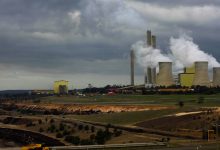The lobbying and activist group Market Forces has filed a shareholder resolution on behalf of over 100 AGL shareholders, calling on the energy giant to accelerate the closure of two of its largest coal power stations, Bayswater and Loy Yang A.
Market Forces hopes that it will be able to gain the support of superannuation funds, who hold significant shareholdings in AGL, to vote for the motion after the funds joined calls for governments to take greater action on climate change.
AGL is Australia’s largest greenhouse gas emitter, thanks to its ownership of some of Australia’s largest coal-fired power stations, which it only bought in 2012 and 2014.
AGL’s brown-coal fuelled Loy Yang A power station ranks as Australia’s highest emitting power station, producing 19.8 million tonnes of CO2-e in 2017/18, with Baywater ranking as the third-highest emitter at 13.7 million tones.The two AGL owned power stations alone combined responsible for around 6 per cent of Australia’s total greenhouse gas emissions.
AGL has flagged its intention to close the Liddell Power station in 2022, but it intends to continue running the Loy Yang A and Baywater power stations until 2048 and 2035 respectively. However, analysis suggests these power stations will need to close sooner if Australia stands any chance of taking action consistent with the Paris Agreement.
“AGL’s business plans are completely at odds with its stated support for the Paris Agreement,” Market Forces legal analyst Will van de Pol said.
“Science tells us Australia needs to shift away from coal power by 2030 if we are to avoid some of the worst impacts of climate change. Investors around the world have repeatedly backed this deadline, yet AGL plans to keep producing dirty coal power almost a full two decades beyond that point.”
In response to the motion lodged by Market Forces, a spokesperson for AGL said that while it agreed with the sentiment of the motion, acknowledging there is a need to act on climate change, it was cautious about calls that would see a company moving unilaterally, ahead of the rest of the market.
“AGL has engaged openly and constructively with Market Forces, and will continue to do so,” an AGL spokesperson told RenewEconomy.
“We agree with Market Forces and other shareholder groups in principle about the importance of managing carbon risk. Where we differ is in the idea that AGL should take unilateral steps or make commitments outside of a framework for climate and energy policy agreed between government, regulators, industry and the community at large.”
“We are continually evolving our disclosures in relation to carbon risk management – reflected in our adoption of the recommendations of the Financial Stability Board’s Taskforce on Climate-related Financial Disclosures – and expect to further evolve and improve these disclosures in FY20.”
“We believe these actions reflect the spirit of the Market Forces resolution even if we differ on the idea that AGL should unilaterally commit to early retirement.”
Market Forces hopes to leverage the backing of institutional investors in AGL, including superannuation funds, who have joined global statements calling for governments to act on climate change.
Many Australian investment managers joined a global statement to governments ahead of a meeting of the G20 in Osaka in June, which called on governments to begin to the process of phasing out thermal coal use, and to take action consistent with meeting the Paris Agreement.
Signatories to the statement included AustralianSuper, Cbus, Colonial First State, First State Super, HESTA, IFM Investors, Local Government Super, Mercer, Statewide Super, VicSuper, and Vision Super.
Super funds have often faced criticism for joining statements calling for greater action on climate change, but failing to use their holdings back shareholder resolutions that aim to push companies to divest from coal assets, or to increase the information disclosed about the business risks posed by climate change.
“As institutional investors with millions of beneficiaries around the world, we reiterate our full support for the Paris Agreement and strongly urge all governments to implement the actions that are needed to achieve the goals of the Agreement, with the utmost urgency,” investors said in the statement.
Given this statement, Market Forces hopes that such funds would use their holdings in AGL to support its motion calling for an accelerated retirement of AGL’s coal-fired generators.
“This shareholder resolution will test the integrity of investors, who have joined broad calls for climate action but now must deliver the same message to the companies they own,” van de Pol said.
“Despite claiming to support the Paris Agreement, AGL doesn’t plan to do its share of the heavy lifting. Unfortunately science doesn’t allow for any free passes, and AGL’s investors must now demand the company produces a plan to meet its stated goals, rather than pretending the rules only apply to everyone else.”
Origin Energy AGM saw a shareholder resolution calling on the energy company to review its membership of pro-fossil fuel lobby groups, including the Business Council of Australia and APPEA, attract a mammoth 46 per cent support, that was seen as a major step forward for shareholder activism in Australia.
“The 46 per cent vote on climate lobbying is the largest vote for any shareholder proposal (without Board support) in Australian corporate history and a clear rebuke to the carbon lobby,” the Australasian Centre for Corporate Responsibility said at the time.
The latest resolution from Market Forces will be considered the AGL annual general meeting to be held on 19 September.






